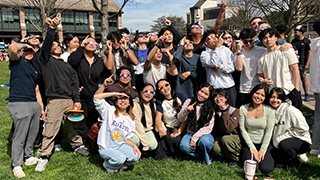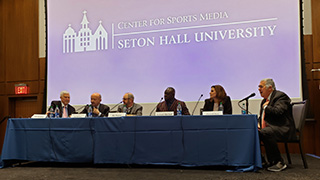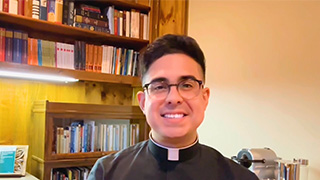History Professor Publishes Stories in Top Literary Publications
Wednesday, March 24, 2021

His works were recently published in the San Antonio Review, MumberMag, BigCityLit, The Wild Word, Foreign Literary and Anti-Heroin Chic. In an interview with New England Review, the literary journal sponsored by Middlebury College and closely affiliated with the Bread Loaf, "the oldest and most prestigious writers' conference in the country," Matusevich talks about the unique responsibility of a historical fiction writer whose perspective imbues the landscapes, circumstances and settings of the stories. "I also tend to see my characters as connected to larger historical narratives, they are always participants in a bigger story," he said.
Professor Matusevich, who teaches global, African and Cold War history, was born in St. Petersburg, Russia. He emigrated to the United States in 1991 as the former Soviet Union dissolved. Previously, he has published stories in leading literary magazines such as The Kenyon Review ("perhaps the best known and most influential literary magazine in the English-speaking world") and the New England Review.
His more recent story, "'Comfort Food,'" captures Matusevich's experience of geographical displacement and the struggle of constructing a multicultural identity.
We're having this conversation in front of the rows of pickled cabbage in jars, next to the freezer filled to the brim with an assortment of pirogi, in plain view of the cans of Riga sprats stacked up like miniature Egyptian pyramids on the shelves running the length of one of the store's walls. Pawel… seems like a nice enough name, he shouldn't be ashamed of it. "Are you from Poland?" I press on, stoked by his reticence. He grumbles some more: "Sort of…" – "What do you mean 'sort of'? You're either from Poland or you're not. Like look—I'm from St. Petersburg, Russia. Not 'sort of from Russia', but really, truly from there, of the place if you will. And you?" – "Poland," he sighs, "a small town forty kilometers west of Warsaw…" "But I really am from Jersey City," he adds quickly as if trying to preempt any further questioning. Now, that's a surprise—I have lived in Jersey City for about ten years now, not long enough to claim it as a place of origin. And here we are—two denizens of Jersey City, two shards of a couple of far more remote locations that apparently cannot be named for fear of jinxing the American dream. We eye each other with suspicion, we sniff each other out for signs of malevolence, of which I harbor none, but Pawel acts like I might. I wonder what had brought him from Jersey City all the way to this small Pennsylvania town. 'All the way' is overstating it, the town is only a couple hours drive from our little gem on the Hudson. Definitely much closer than Warsaw. Or that small hamlet forty kilometers to the west of the capital, that served as Pawel's home base prior to his relocation across the Atlantic. Strangely, that particular leg of his life's journey is easier for me to reconstruct.
In another piece, "A Walmart Love Story," he comments on the classed assumptions that underpin successful integration into American society.
Petite filet mignons at Walmart Supercenter in Honesdale, Pennsylvania sell at eleven dollars and eighty-two cents a pound. I pick up four wrapped in plastic film, and place them in the cart next to the romaine lettuce and two organic English cucumbers. There are non-organic cucumbers in the adjacent section, and they are a dollar eighty-five each, as opposed to two dollars and ninety-six cents for the organic ones. Eleven eighty-two, one eighty-five, two ninety-six. How do they ever come up with these figures? I overpay for organic produce, because overpaying at Walmart Supercenter is really a sign of class. Or hubris. Or aspiration. Or my recently acquired class consciousness.
Read the full stories in The Wild Word and Anti-Heroin Chic.
Categories: Arts and Culture, Education, Nation and World





